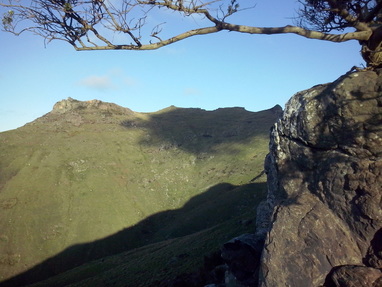 This post isn't about some new idea in psychotherapy or counselling, or about the psychology of the social or environmental issues we collectively face. It's about the afternoon that I spent yesterday taking some of my own medicine - a dose of ecotherapy. The first thing I want to say is that it's so strange, that it takes getting a bit sick and run down and feeling like I have to stop running in the rat race, to actually give myself something different. Weaving through traffic and the unexpected traffic jams, I felt like I was making a prison break. I half expected that some last work commitment or emergency would stop me from getting to the start of the trail I was headed to at the base of the port hills. In hindsight I was actually worried that I'd flake out without a good excuse, and then have to face having sabotaged my own aspiration without even having an external barrier as a justification. As I began to walk up the gentle (and then steep) uphill start of the trail, this slightly urgent anxiety to escape began to relax as I felt committed to the trail and direction I had selected. Soon this commitment began to shift to excitement and desire to see the view from the next crest of the hillside. I could feel my empty physical and emotional gas tank begin to refill. Pausing often, to turn around look behind, I began to get perspective on the city. No longer a trapping and limiting, stress and anxiety provoking maze through which I madly run, Christchurch had become a sweeping vista. As I continued to climb, being an ecotherapist, I kept tuning in to the mental and emotional shifts that were happening inside of me. I noticed that as I began to sweat and glow from the climb, I began to feel more robust and confident, feeling my own capacity to work and progress and rise up over my previous foul mood. By the time I had reached the top I had also reached within myself a strong feeling of gratitude. This gratitude was towards myself, for having given myself this experience and worked for it, but also for having the amazing geography of the port hills so close by. The thought occurred to me: "I am made for this." And I think that's true. I, and you, were made to move through landscapes and to work physically, roam, to find new paths, and to trust the instincts of the body rather than a schedule or a fluorescent office environment. I don't happen to believe that a personal deity came along and made this world to suit my needs, but it's a pretty good moment when I spontaneously find myself feeling that evolution made me to enjoy walking, looking out at views, and feeling the wind on my face. The descent felt less ecstatic, but still important. I'm not going to live the rest of my life (or even much of it) out on a hillside, as much as I can love it for a while. The impulse to escape the city had shifted to a readiness to return, a sense of warmth and tolerance towards the people and activities that I had needed a break from. Descending is not about ecstasy, it is about careful details of placing a foot in such a way that we do not slip or turn an ankle. As much as the details of my life persecute me at times, it was good to feel ready for rather than resistant to the painstaking detailed work of descending. I'm glad to be able to share this experience with you through this blog post, but I'd like to take this further. A hell of a lot of research and my own experience tell me that those of us who struggle with issues such as anxiety or depression will find this sort of experience at least as beneficial as sitting in a therapy room with me. I look forward to starting up ecotherapy experiences this spring, so stay tuned for that!
0 Comments
When Psychotherapists and Counsellors start their training, usually the first thing that they're taught to do is to listen to what their clients say, and then to give succinct summaries back to the client, so that the client can hear what they've just said, and that they've been heard. In worst case scenarios, this leads to experiences of sitting down with a therapist, pouring out one's heart to them, and hearing back in a some-what parrot-like way, the gist of a the problem for which one so desperately is seeking a solution. Of course, it's important that your Counsellor or Psychotherapist actually does listen to you, and certainly that is better than simply having one's feelings shut down, or covered over by advice. That said, I do think that in a way, therapists still do listen too much.
The reason why I say this, is that we all use the defences that I've written about in previous posts, practically all the time. Furthermore, it is usually the use of some of these defences, that are actually creating the problem in the first place. Frequently, even at the start of a first session, a client's defenses will stop them clearly describing to me what the problem is that they'd like me to help them with. For instance, when I ask during an initial session what the problem is that my client would like me to help them with, they may reply with the defence of projection (of their will) by telling me (indignantly) that their psychiatrist thinks they have a problem! Or they may reply whilst using the defence of withdrawal, telling me about the problem in such a small tone of voice, and without making eye contact, that it's as if they're miles away from me. If we can't clearly agree on what the problem is that we're trying to address through therapy, it's unlikely that we're going to be able to work together effectively on dealing with that problem. According to intensive short term dynamic psychotherapy (ISTDP), it is our defences that creating our problems, and therefore are hurting us. It's my job to (with the client's permission) to interrupt their automatic and unconscious use of defences. For instance, withdrawal and isolating is often part of what perpetuates depression. By helping a person to see in a session how they withdraw from me by not looking at me, mumbling, or talking in a small tone of voice, I can help them to begin to experiment right there and then with making some of the changes that will help alleviate the depression that they wanted my help with. This brings me in a roundabout way to the title of the post. Psychotherapists and counsellors need to do more than just listen. Sometimes actually helping a client is to interrupt them, and help them to begin to express the emotion that they need to deal with, rather than spin around helplessly getting nowhere because they're using a defence without even realising it. I'm not suggesting a tactless of callous form of therapy. To skillfully interrupt a client's defence in the right way at the right time is an act of caring, and healing. The people who come to me for therapy usually don't know the technical information about defences and different styles of therapy, but they can feel the sense of relief when their use of defences has been interrupted and they can actually feel themselves again, and begin to choose a more healthy way of relating. Somatising is a controversial defence mechanism for a number of reasons. Overall, somatising is not understood well by many professionals, including psychotherapists, counsellors, and psychologists. Somatising is often confused with hypochondria (a preoccupation with or fear of signs of illness), which though a real mental health issue in it's own right can be misunderstood as a manipulative or silly bid for attention.
In essence, through somatising we fend off a disturbing reality or painful feeling and instead experience it as a physical illness. When the unconscious underlying pain is fully felt and acknowledged, the symptoms of the somatising - the psychosomatic illness, reduce or disappear. Over time society has become more sophisticated in it's understanding of how mind and body interrelate. It is a mainstream and accepted idea that stress and anxiety can contribute to physical illnesses. Somatising, however, is more complex than this. At Lucid Psychotherapy and Counselling we are influenced by a form of therapy called ISTDP - intensive short term dynamic psychotherapy. According to ISTDP, anxiety or stress per se, does not make us sick. What is crucial is the way, or pathway, through which we experience anxiety. Though nothing in this blog can or should substitute for medical advice, if your experience of physical illness seems to be connected with your degree or anxiety or the anxiety provoking situations in your life, you may be somatising. |
AuthorsMichael Apathy and Selina Clare are practitioners of psychotherapy at Lucid who are excited about fresh, innovative, and effective therapy for individual and environmental change. Categories
All
Archives
December 2016
|
Specialty Areas |
Online BookingBook my first session.
If there are no bookable services showing via the online booking website, this means we currently have a waiting list for new clients. Please give us a call or email if you would like to add your name to it. |

 RSS Feed
RSS Feed